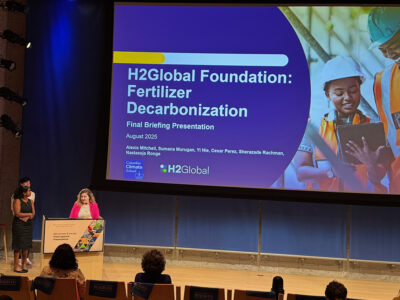
As an 8-year-old living in the Hassan district of Karnataka, India, Vishal Manve recalls already being attuned to the sociopolitical impacts of climate change. In his own family, Manve witnessed his Ajji (grandmother) struggle to accurately gauge the changing rainfall to predict its impact on seasonal rice cultivation and what this would mean for their household savings.
Since then, Manve has looked for ways to help make the world more sustainable and just, especially for vulnerable communities—first as a journalist and now as a student at the M.A. in Climate and Society program at the Columbia Climate School, where he is specializing in Climate + the Built Environment. Learn more about Manve’s journey in the Q&A below.
Tell us how you found your way into the climate space.
Having spent over eight years as a journalist, the majority of which was with the Agence France-Presse, I was reporting on the Indian economy and the central bank as well as political and climate change-linked stories. I knew the groups worst hit by disasters were the vulnerable communities already dealing with the impact of climate change.
I was privileged to secure a few key fellowships that helped me transition to focusing on the intersection of climate policy, communities and economics, such as Climate Tracker’s South Asia fellowship and CIVICUS’ reporting fellowship in Serbia. These opportunities taught me about the intersectionality of gender, socioeconomic indicators and existing inequities, and to foray further into the climate field while gaining holistic quantitative and qualitative skills.
During the early months of COVID, I reported extensively on the virus for Agence France-Presse. I then received an M.A. in Law and Diplomacy at The Fletcher School at Tufts University, where I studied policy aspects of the energy transition, international climate policy, sustainable development and technology policy. I also took courses at the Harvard Kennedy School and the Harvard T.H. Chan School of Public Health during this time.
Why did you decide to apply to the Climate and Society program?
While I have studied policy and the foundations of energy and environmental systems, I believed I needed a sound distillation of climate science, economics, and mitigation and adaptation perspectives. The intersectionality and the academic rigor of the core classes drew me to this program.
Additionally, being situated in the heart of New York City means there will be multiple avenues to attend engaging events, network with experts, and learn from different perspectives and schools located within and in the periphery of Columbia University.
Which class are you most looking forward to and why?
I am very excited about my area of specialization, Climate + Built Environment, and extremely excited to be in Kate Orff’s class. The readings, field visits and nuanced approach to evaluating how we can plan and design solutions and systems to tackle and adapt to climate change by centering communities is something that resonates deeply with me. I would highly recommend this course to anyone who is trying to understand how adaptation can work with nature-based solutions.
What do you envision as your future role in solving the climate crisis?
I visualize my role as an enabler—bringing together policy, technology, finance and science to focus on engineering solutions that can mitigate and reduce harmful greenhouse gas emissions while helping companies fine-tune their environmental, social, and governance (ESG) and environmental resources management strategies.
Hailing from a policy and communications background, I am adept at working on international climate policy (I previously worked at the United Nations Framework Convention on Climate Change with the Global Innovation Hub, conducting global stocktake assessments) and curating communication strategies. Therefore, as a sustainability and ESG consultant, I will aim to help governments, the private sector and consulting firms navigate a complex landscape and pivot to decarbonizing their supply chains swiftly.
As a former journalist, I also want to continue to spotlight rising inequities exacerbated by climate change and to focus on communities that need our urgent help through climate finance, technology transfer and aid. Every community has adaptive capacity but we must ensure we give them the tools and resources they need to survive and thrive in an ever-changing ecosystem impacted by extreme climate change.
Is there anything else you’d like to add?
While climate change is the biggest story unfolding in our lifetime, scientists have been ringing the alarms for decades. We lack representation for many vulnerable groups and intersectional communities, including BIPOC and LGBTQIA+ individuals, who face different levels of risk, vulnerability and existential threats. The biggest fear when introducing efforts to decarbonize and establish net-zero pathways is leaving vulnerable populations behind—many of whom are either in the global south or belong to communities that are historically marginalized. As we galvanize finance and inter-governmental coordination and reengineer systems, we must bring multiple perspectives and voices to the policy arena.
It causes me immense anxiety and grief to witness the insurmountable tragedies and challenges lying ahead. But looking at global and domestic mobilization efforts, I have great hope that we can prevent cataclysmic climate impacts through science-backed policy-making, supported by market mechanisms and overall behavioral shifts.




Great insights.